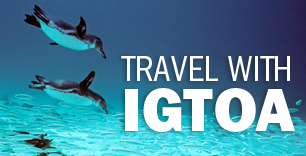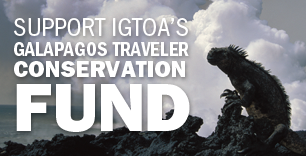Search
Tag Cloud
Subscribe
IGTOA Donates $15,000 to Help Galapagos Teens Become Conservation Leaders
"This course changed my way of thinking 100%. It taught me to take care of these islands, if we want them to continue existing. I learned that small actions can make a big impact on our future."
— Walter, Ecology Project International Youth Participant
The future of the Galapagos Islands ultimately lies in the hands of the people who live there. That's why IGTOA is proud once again to support the important work of Ecology Project International (EPI). Our recent grant of $15,000 will help fund conservation education opportunities for 170 high school students in the Galapagos Islands. EPI's Galapagos program, which is supported by the Galapagos National Park and the provincial Ministry of Education, provides young people with the tools they need to become conservation leaders and responsive stewards of the archipelago’s natural resources. Including this recent grant, IGTOA has donated $34,600 to EPI since 2012.
Much of the endemic biodiversity of Galapagos is under threat of extinction, yet opportunities for local youth to engage in applied conservation research and experiential education are limited. Fewer than 40% of local residents were born in the Galapagos and the majority of residents have not had the opportunity to visit the National Park and meaningfully connect with their natural environment. Furthermore, students in the Galapagos have traditionally lacked access to outdoor learning opportunities; education in Galapagos follows a traditional, classroom-based model which fails to provide access to the spectacular, natural laboratory of Galapagos.
This fundamental disconnect between many Galapagos residents and their environment could have serious repercussions for future conservation efforts in the archipelago. Simply put, people who understand and appreciate their own environment are far more likely to care enough to want to protect it. That's why IGTOA believes that education is the single most important strategy for protecting and preserving the Galapagos Islands. The experiential learning opportunities that EPI provides build capacity for critical thinking, a personal conservation ethic, and a deep awareness of critical environmental issues. Their programs have demonstrated effectiveness in building environmental literacy and encouraging participants to get involved in conservation.
During each four-day EPI course, teens learn placed-based ecology and biology, collect data on a keystone species, and help restore native habitat. In the process, participants begin to understand their role in the conservation issues facing the archipelago and become inspired to become active participants in the conservation of the islands. Since 2003, more than 1,700 local residents have participated in EPI’s program.
Thank you to IGTOA members and their guests for their generous support that made this grant possible.








